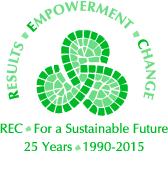EPA's Role with the Regional Environmental Center (REC) for Central and Eastern Europe
The Regional Environmental Center (REC) for Central and Eastern Europe provides assistance in solving environmental problems in Central and Eastern Europe by promoting cooperation among governments, non-governmental organizations, businesses and other environmental stakeholders; and by supporting the free exchange of information and public participation in environmental decision-making. Established in 1990 by the United States, Hungary and the European Commission, the REC is a non-partisan, non-advocacy, not-for-profit international organization.
Highlights
- EPA joined the REC for a celebration of 25th Anniversary of the Regional Environmental Center (REC) for Central and Eastern Europe at a high-level Ministerial event on June 10-11, 2015.
- Timeline: Learn about EPA's history with the REC.
- Visit the home page of the Regional Environmental Center (REC) for Central and Eastern Europe. Exit
History
The REC was created after the fall of the Berlin Wall, as the result of a 1989 U.S. Presidential Initiative to assist the emerging democracies of Central and Eastern Europe in addressing significant environmental challenges, while promoting regional cooperation. As part of this effort, EPA managed a robust program of environmental technical assistance in the region throughout the 1990s with financial support from USAID.
- The REC is legally based on a Charter that has been signed by the governments of 31 countries and the European Commission. The Charter officially confirms the institutional support of all Signatories for the REC’s mission and programs.
- United States support for the REC was provided through the Support for East European Democracy (SEED) Act of 1989, which designated EPA as the U.S. Government lead in establishing the REC. More than twenty years later, EPA – through its Office of International and Tribal Affairs – remains the REC’s primary U.S. partner.
- To date, the United States has provided more than $12 million in direct funding for the REC as well as significant in-kind technical support.
Current Programs
- Strengthening institutions for sustainable development;
- Capacity-building and partnership support;
- Sustainable management and use of natural resources; and
- Integration of environmental concerns such as climate change and environmental health into relevant policy sectors such as energy and transportation.
The REC celebrated its 25th anniversary in 2015.

